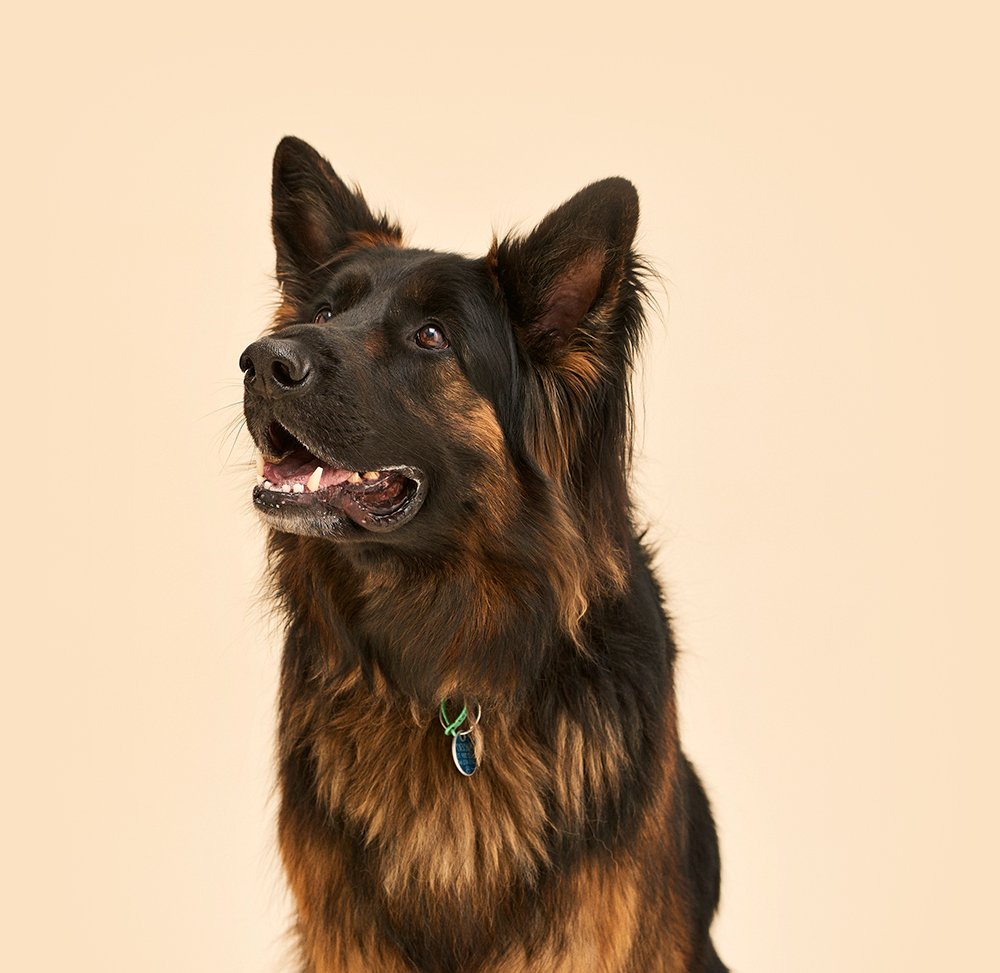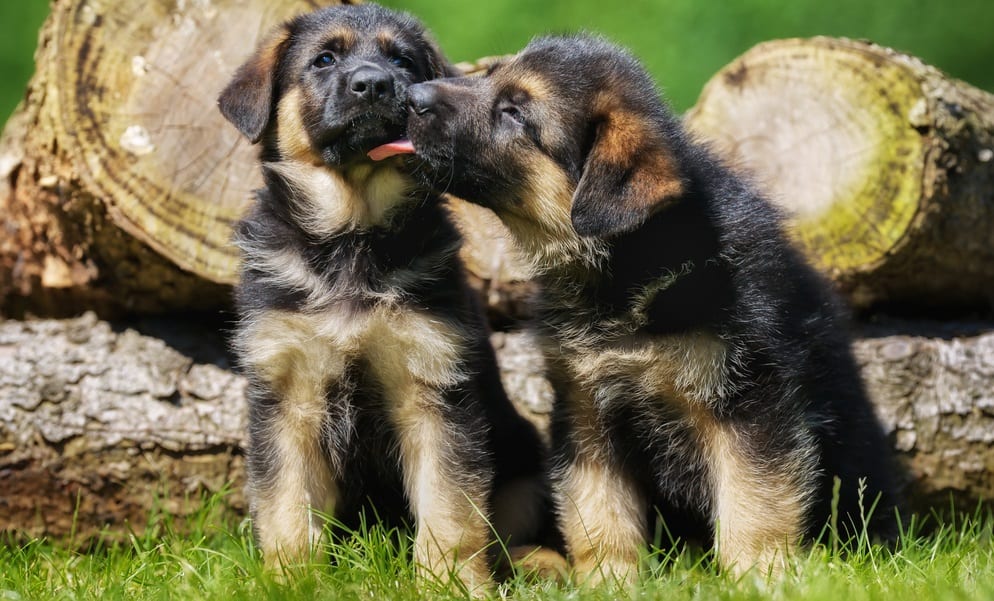Do you have a German Shepherd and uncertain what type of dog food to give them? Look no further, this comprehensive guide will provide you with the knowledge and assurance to make the best decision for your pup!
Discover how to find the right nutrients, understand labels, and evaluate ingredients- all tailored towards German Shepherds.
German Shepherds are one of the most popular large dog breeds, noted for their loyal and intelligent personalities. As with all pet owners, caring for your German Shepherd starts with choosing the right food. The right food not only provides the right nutrition but will also give your pup a longer and healthier life.
Before you choose a specific brand, it’s important to understand what goes into providing a nutritionally complete and balanced diet for these powerful canines. The foundation of any dog’s diet should always be high-quality ingredients that support optimal health. This guide will provide all the information you need to make educated decisions when it comes to selecting dog food that is appropriate for your German Shepherd’s unique needs.
Understanding German Shepherds
German Shepherds are a medium-sized herding dog that are quick, agile, and smart. They can be loyal family pets or hard-working police and military dogs, depending on the way they are trained. German Shepherds should have a well-balanced diet of protein, grains, and vegetables to stay healthy.
The best dog food for German Shepherds should contain high-quality proteins from animal sources such as beef, lamb, chicken, fish or eggs. It should also contain complex carbohydrates such as brown rice or oats for sustained energy release as well as essential fatty acids like Omega-3 for optimal health. Lastly it should also be fortified with essential vitamins and minerals to help support your German Shepherd’s immune system.
When choosing the right dog food for a German Shepherd it is important to take into consideration their age and activity level. Puppies need a higher concentration of fat and protein than adult dogs while more active breeds will require higher levels of certain nutrients in order to maintain optimal energy levels. If you are unsure which type of food is best suited for your German Shepherd please consult your local veterinarian.

Brief history and characteristics of German Shepherds
German Shepherds are a medium-sized, muscular breed of dog renowned for its intelligence and loyalty. Originating in Germany in the late 19th century, the breed was used for herding sheep, but has since become a popular companion and working dog. These dogs typically weigh between 30 to 40 kilograms (66 to 88 pounds) and can live up to 12 years of age. German Shepherds are especially known for their agility and obedience, and excel at many tasks like backpacking, carting, tracking, search and rescue, therapy work and obedience competitions.
The temperament of German Shepherds varies greatly depending on environmental factors like training and socialization. They tend to be calm in most situations but may become territorial if not properly socialized – that is why it is important to find proper nutrition suited to each individual pup’s needs. Proper nutrition is essential for growing healthy adults with excellent physical health and an individual personality that reflects its breed’s traits. It should be noted that while they have a long life expectancy compared to other breeds, they may also suffer from genetic health problems like hip dysplasia or joint problems so special consideration must be taken when providing food sources tailored towards their needs as these can help prevent health issues later in life.
Nutritional requirements of German Shepherds
German Shepherds are a unique breed of dog which require particular foods to fulfill its dietary needs. As with all dogs, the primary focus should be on providing a well-balanced diet made up of quality proteins, healthy fats, carbohydrates/fiber and vitamins/minerals. However, German Shepherds have some different nutritional requirements compared to other breeds of dogs.
When choosing dog food for German Shepherds, it’s important to consider its natural diet as a breeding for duty and herding cattle. A German Shepherd needs high-quality proteins from animal sources such as beef and chicken to help them build strong muscles and maintain joint health. Dietary fat is also important to provide energy and nourish the skin and coat of your dog. Some carbohydrates are necessary for the digestion process but they should comprise no more than 20-30% of the total caloric intake. Vitamins and minerals are essential nutrients that help support your dog’s overall health such as helping build strong bones, developing a healthy immune system, regulating blood sugar levels etc.
It is recommended that German Shepherds be feed specific high-quality formulations that cater specifically to their unique nutritional requirements—ideally these should contain an optimal balance of nutrition tailored specifically to their size and energy needs along with other added benefits depending on your predicament: resistance against allergies & skin irritations; shiny coat & healthy teeth; digestive support & immunity boost etc… When selecting dry food make sure there’s enough protein content— probably from quality sources like poultry meals or fresh meat lamb—as well as plenty of chelated minerals for better bioavailability (zinc & selenium), taurine for heart health maintenance, linoleic acid (omega 6) for eye/skin support …etc… In addition, supplementing with wet or raw food options often assists in preserving muscle mass in older or working dogs since it’s higher in moisture content than dry formulas.
Last but not least select foods have above average concentration of omega 3 eicosapentaenoic acid (EPA) – salmon oil being known particularly beneficial thanks primarily to its ability inhibiting inflammation making it great tool dealing with hip dysplasia issues which often affect this breeds later in life stages.
III. Ingredients to Look for
It’s important to ensure that high-quality ingredients are used when choosing the best food for German shepherds. Here are some of the key ingredients to look for in your dog’s food:
- Protein: An ample amount of high-quality lean protein is critical for providing energy and helping to maintain strong bones, muscles, and hair coat. Look for a named animal protein as the first ingredient (i.e., “chicken meal” or “turkey meal”).
- Fats and Oils: Trans fatty acids are unhealthy and should always be avoided. Omega-3 fatty acids from sources like fish oil can be beneficial for keeping German Shepherds in tip-top shape, so a food that contains these oils is ideal.
- Carbohydrates: Quality carbohydrates provide essential fiber that aids digestion and helps absorb vitamins and minerals more efficiently from the GI tract into the bloodstream. Ensure that complex carbohydrates such as brown rice, oatmeal, or sweet potatoes are used as opposed to lower quality sources like corn syrup or white flour products – they don’t offer any real nutritional value; plus they can cause an energy crash later on since your dog’s body doesn’t get sustained energy out of them as easily as with complex carbs.
- Vitamins & Minerals: Vitamins and minerals must be carefully balanced or else significant deficiencies or imbalances can arise resulting in health issues down the line; look for brands which use chelated minerals where possible (which is when multiple minerals molecules are bound together with an amino acid like glycine making them more digestible). Your veterinarian may have specific vitamin/mineral supplementation recommendations depending on any potential hereditary issues common with German Shepherds.
High-quality proteins
When it comes to choosing the right food for your German Shepherd, you should look for one that contains high-quality proteins. These proteins should come from animal sources such as chicken, beef, and lamb — as these are the best choices for your German Shepherd’s health. You should also make sure that the food is rich in other essential nutrients like vitamins, minerals, and essential fatty acids. These nutrients are important in helping to keep your pet’s coat healthy, strong bones and joints resilient, and a brain functioning well.

Complex carbohydrates
Complex carbohydrates include starchy and fibrous-type carbohydrates like oats, rice, sweet potatoes, potato and barley. Most good quality dry dog foods will feature some type of complex carbohydrate as an ingredient. Complex carbohydrates can help maintain a steady energy level without causing an immediate spike in blood sugar.
For German Shepherds especially, diets high in carbohydrates can help sustain healthy and lean muscle mass while providing a good source of energy. Additionally, complex carbohydrates may also help regulate digestion and enhance gut health.
Be sure to read labels carefully as grains and other fillers can be disguised by marketing terms such as meal or by-products. Quality dog foods should always provide some form of complex carbohydrate listed as the first or second ingredients after protein sources.
Healthy fats
Healthy fats like omega-3 and omega-6 fatty acids are an essential part of a German Shepherd’s diet. These essential fatty acids are found in fish and flaxseed oil, poultry, meats, legumes, and whole grains. Additionally, some foods are fortified with vitamins A and E which have been linked to healthy skin and shiny coats in dogs. Look for labels that include these healthy fats and list them as the top 3 ingredients on the package label.
Many brands now offer extra virgin olive or coconut oils as delicious supplements to your German Shepherd’s diet. Fats should make up no more than 10% of your dog’s total daily caloric intake; this includes all fat sources combined (meat, vegetable oils). Make sure to measure how much food you give your dog so that you don’t overfeed them!
Vitamins and minerals
Vitamins and minerals are important components of a dog’s diet, whether commercial or homemade. A German Shepherd’s dietary requirements are typically different than those of other breeds, as their size and activity level demand more energy.
Choose a complete and balanced dog food specifically formaulated for the breed’s needs. A German Shepherd should receive an essential combination of vitamins, minerals, proteins and carbohydrates to ensure sustained energy levels and healthy growth. Be sure to ask your veterinarian for advice when selecting a food for your pet.
When picking a great food supplement for your pet, look for one containing all the necessary vitamins like vitamin E, C and B-complex; along with antioxidants like lycopene; with plenty of trace elements including selenium and zinc; with essential fatty acids such as EPA, DHA; and additionally the right kind of carbohydrates like gluten-free grains which help keep energy levels constant throughout the day. Lastly make sure that it has taurine present which is crucial in heart health maintenance amongst other benefits offered by this awesome supplement!
Ingredients to Avoid
When selecting the best food for your German Shepherd, there are certain types of ingredients that should be avoided to ensure the health and well-being of your pet. It’s important to understand why certain ingredients can be damaging to their health, so make sure you read labels carefully and do some research when selecting the right food.
Some of the ingredients that should be avoided include: wheat (including wheat gluten), corn, artificial colors, sugar and salt. Many common dog foods contain these items as fillers or preservative agents, which can cause health issues for your dog. In addition to these, it’s wise to avoid low-grade products containing low quality animal fats such as byproducts from unnamed animals or animals classified as “4D”. 4D stands for “Dead, Dying, Diseased or Disabled” – all of which should be avoided when possible. As a result of these poor grade animal resources being used in production many processed dog foods have been linked with tumors, cancer and other degenerative diseases in dogs.
Other grains such as barley and oats may be found in some higher quality products but it is much better to opt for gluten free grain sources with no artificial additives whenever possible.
Artificial preservatives
Artificial preservatives are commonly added to dog foods to extend shelf life. While these ingredients may help keep food fresh for longer, they can also be detrimental to your pet’s health. Artificial preservatives like propylene glycol and ethoxyquin can cause skin irritation and other symptoms. It is best avoided if possible, as there are many healthy alternatives available.
Natural preservatives such as mixed tocopherols, rosemary extract, citric acid and vitamin E are generally safer for your dog’s health. It is important to look for these on the ingredients list when choosing a food for your German Shepherd. Additionally, some commercial foods may contain a “freshness guarantee” which means that they are guaranteed fresh up to a certain point because natural preservatives have been used instead of artificial ones.
Artificial flavors and colors
Artificial flavors and colors are widely used in dog food products to enhance the taste of pet food. Some pet owners may think that because artificial ingredients are labeled as safe for human consumption, they must be safe for animals. However, this is not always the case since dogs may have a different biochemical makeup from humans and could be more sensitive to the effects of their ingredients. Therefore, it’s wise to avoid artificial flavors and colors found in commercial pet foods whenever possible.
Artificial flavors give your dog’s food a flavor that can make them want to eat it, but artificial coloring does not provide any nutritional value for your pup. Not all artificial dyes have been tested on dogs and have been proven safe for their consumption; thus, using pet foods with no or minimal amounts of added colorings is recommended.
High amounts of sugar
High amounts of sugar should be avoided when selecting a food for a German Shepherd puppy, adult, or senior dog. Sugar can lead to dental and digestive problems and can also cause obesity due to excess calorie intake. It can also disrupt the microbial balance in the gut and increase inflammation throughout the body.
Many commercial dog foods contain processed ingredients like corn syrup, dextrose, and other high-fructose corn syrup sources that are not appropriate for active dogs like German Shepherds. Look for foods that do not list sugar as one of their main ingredients. Additionally, be sure to read ingredient labels carefully and avoid any unknown sugars listed as added carbohydrates.
Also keep an eye out for foods with honey listed as an ingredient; honey contains natural sugars that may contribute to health issues in dogs if consumed in large amounts over time.

Conclusion
When it comes to selecting the perfect kibble for your German Shepherd, you have a lot to consider. The age and activity level of your Shepherd will impact what type of food will be most appropriate.
Additionally, consider the ingredients used in the kibble that you pick out. Look for ones with high-quality proteins and carb sources that are easily digestible by the dog.
Finally, make sure you pay attention to the vitamins and nutrients necessary to ensure your German Shepherd is getting all its essential nutrients.
By following this guide and ensuring you are considering all these factors, you’ll be well on your way to finding a great food choice for your German Shepherd!
FAQ
Which dog food is best for German Shepherd?
There are many good dog food brands that are suitable for German Shepherds, such as Royal Canin, Hill’s Science Diet, and Orijen.
Which dog food is best for German Shepherd?
Some popular dog food brands in India that are suitable for German Shepherds include Royal Canin, Pedigree, and Drools.
Should GSD be grain or grain free?
It depends on the individual dog’s needs and preferences. Some German Shepherds do well on grain-free diets, while others thrive on diets that include grains.
How do I choose the right dog food for my dog?
Consider your dog’s age, breed, activity level, and any health issues when choosing a dog food. Consult with your veterinarian for recommendations.
Is Royal Canin good for German Shepherd?
Yes, Royal Canin has a specific formula designed for German Shepherds that is tailored to their unique nutritional needs.
What foods should I avoid with my German Shepherd?
Avoid feeding your German Shepherd foods that are toxic to dogs, such as chocolate, grapes, onions, and garlic. Also, avoid giving them fatty or spicy foods that can upset their stomach.
Can German Shepherds eat chapati?
Yes, German Shepherds can eat chapati in moderation as part of a balanced diet.
Is pedigree good for GSD?
Pedigree is a popular dog food brand, but it may not be the best choice for all German Shepherds. Consult with your veterinarian for recommendations.
What does German Shepherd eat?
German Shepherds can eat a variety of dog food brands that are available in the market, as well as homemade meals that include rice, vegetables, and meat.
Can we give roti to German Shepherd?
Yes, German Shepherds can eat roti in moderation as part of a balanced diet.
See Also :
- Best crates for german shepherds 2023
- Best collar for a german shepherd 2023
- Best brush for german shepherd 2023
- Best shampoo for german shepherds 2023
- Best puppy food for german shepherd 2023


